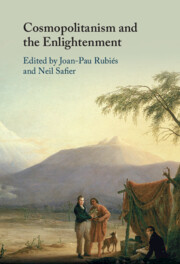Book contents
- Cosmopolitanism and the Enlightenment
- Cosmopolitanism and the Enlightenment
- Copyright page
- Dedication
- Contents
- Figures
- Contributors
- Preface
- Acknowledgments
- Introduction
- 1 Enlightenment Cosmopolitanism in Perspective
- 2 The Cosmopolitan Paradox
- 3 Diderot’s Conjectural History and the History of “Monstrous Nature”
- 4 Geographies of Cosmopolitanism
- 5 The Imperial, Global (Cosmopolitan) Dimensions of Nonelite Colonial Scribal Cultures in the Early Modern Iberian Atlantic
- 6 Gendered Cosmopolitanism?
- 7 Cosmopolitanism and the Creation of Patriotic Identities in the European Enlightenment
- 8 A Cosmopolitanism of Countervailing Powers
- 9 Cosmopolitanism and Civil War
- Afterword
- Index
6 - Gendered Cosmopolitanism?
The History of Women and the Science of Man in the Scottish Enlightenment
Published online by Cambridge University Press: 16 March 2023
- Cosmopolitanism and the Enlightenment
- Cosmopolitanism and the Enlightenment
- Copyright page
- Dedication
- Contents
- Figures
- Contributors
- Preface
- Acknowledgments
- Introduction
- 1 Enlightenment Cosmopolitanism in Perspective
- 2 The Cosmopolitan Paradox
- 3 Diderot’s Conjectural History and the History of “Monstrous Nature”
- 4 Geographies of Cosmopolitanism
- 5 The Imperial, Global (Cosmopolitan) Dimensions of Nonelite Colonial Scribal Cultures in the Early Modern Iberian Atlantic
- 6 Gendered Cosmopolitanism?
- 7 Cosmopolitanism and the Creation of Patriotic Identities in the European Enlightenment
- 8 A Cosmopolitanism of Countervailing Powers
- 9 Cosmopolitanism and Civil War
- Afterword
- Index
Summary
Is gender a useful category for querying cosmopolitanism? Do women take part in the unfolding of Enlightenment cosmopolitan civilization? Do they change its understanding and conceptualization? If so, in what sense? The aim of this chapter is to stress the symbolic and material role that women played within a universal and cosmopolitan history, which, in the Enlightenment, coincided with the history of civilization. Focusing on the emerging of a new historical genre in 1770s Scotland, the history of women, the chapter first examines the civilising role assigned to women as agents of culture in the process driving to commercial and cosmopolitan societies. Then, it explores why and how the ‘progress of the female sex’, potentially universal, was in fact instrumental to distinguish the history of European civilization from all the others. Within this framework, the focus on sexuality offers a space for looking at the crystallization of the differences between peoples, where the reproductive powers of women’s bodies are central. The final section deals with the other side of this same discourse: the ambiguity of civilization in modern and commercial societies of Europe, which were expressed in the fear that progress could be reversed into its contrary, turning the ‘civilizing femininity’ into ‘decadent effeminacy’. The question, then, is to what extent does cosmopolitanism lead to effeminacy and decadence, and how is this related to women’s agency?
Keywords
- Type
- Chapter
- Information
- Cosmopolitanism and the Enlightenment , pp. 177 - 207Publisher: Cambridge University PressPrint publication year: 2023
- 2
- Cited by



